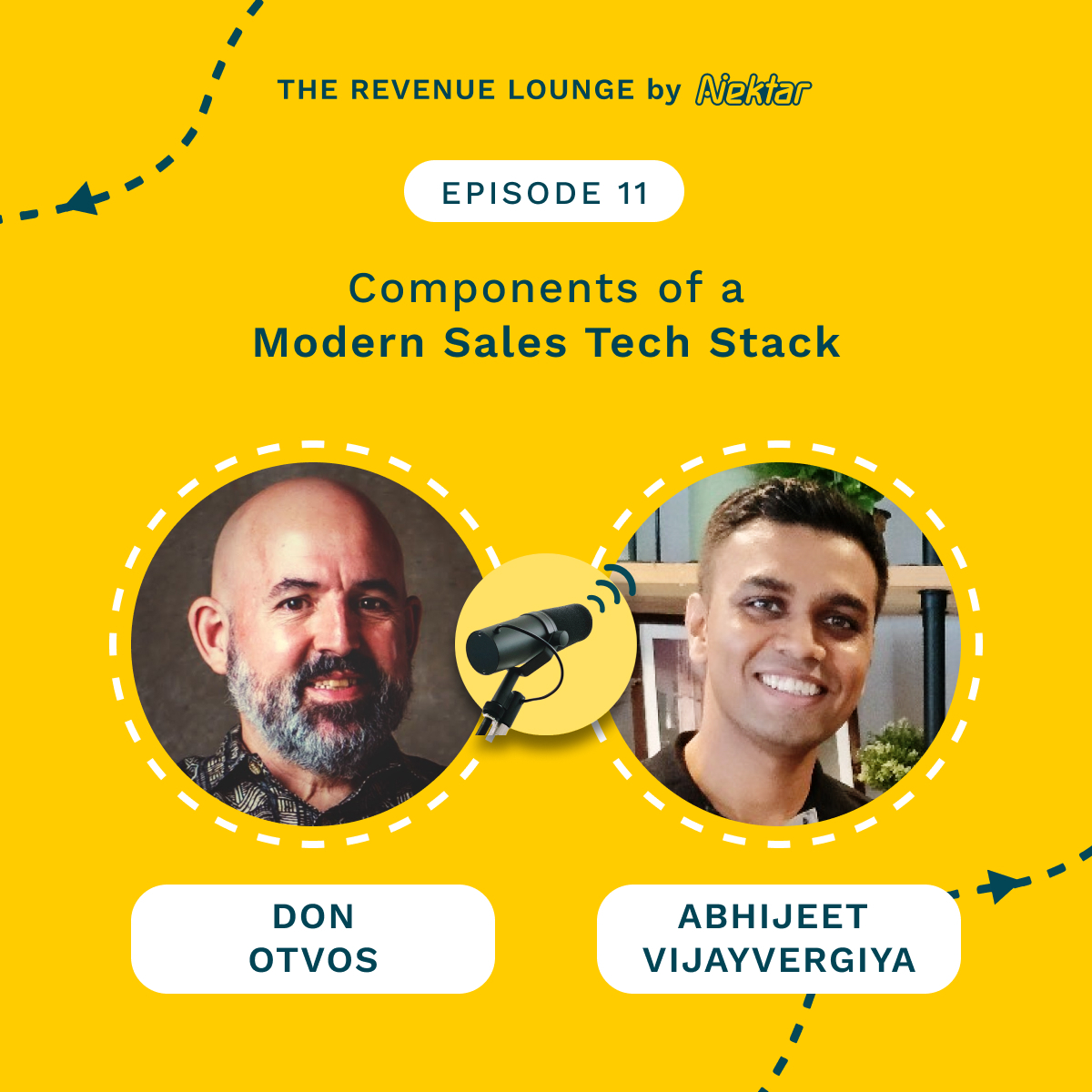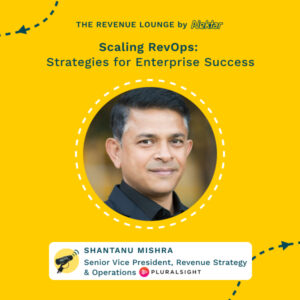Ep #8: Setting Up a RevOps Team From Scratch
November 2, 2022
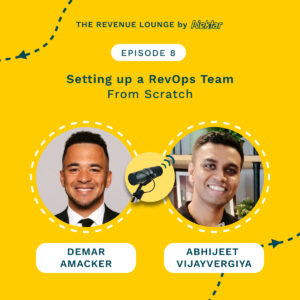
About
The Revenue Lounge
The podcast covers stories from leaders across RevOps, Sales, Customer Success, GTM, Data and Marketing about what drives these functions and what advice they would share with our listeners. With 3 seasons recorded, the podcast currently features 50+ enterprise leaders in the B2B SaaS domain. Tune in to hear from the best in the business
This episode is an attempt to uncover the A-Z of setting up a revenue operations team from scratch. It answers questions like:
- When is the best time to build RevOps in an organization?
- What are those first steps?
- How do you go from that first step to implementing a RevOps function and start deriving value from it?
Demar Amacker helps unravel these mysteries as the guest in this episode. He is an organizational thought leader in the field of business operations and sales strategy. His expertise lies in successfully managing strategic operational processes, monitoring and managing project effectiveness, and leveraging internal systems to drive improved efficiency and elevated performance.
Let’s hear it from him!
Want to learn more about Nektar?
Talk to our team – https://bit.ly/3zyCmlU

[00:00:00] Our guest today is Demar Amacker , an organizational thought leader in the field of business operations and sales strategy. His expertise lies in successfully managing strategy, operational processes, monitoring and managing project effectiveness, and leveraging internal systems to drive improved efficiency and elevated.
[00:00:18] Demar, thanks for joining us today.
Yeah, thanks. Thanks for having me. Glad to be here.
Yeah. Yeah. We’d love to know more about your day to day work and, and the strategic priorities as we go through the conversation. So just for our audience in today’s episode, we are going to uncover the A to Z of setting up a Revs team from scratch, and it’s one of my favorite topics.
[00:00:39] A lot of founders and sales leaders I speak with, they’re struggling to figure out where to start with. Rev ops is such a massive. Broad function, and it’s such a core function now to any GTM organization, but it’s baffling to see that many folks don’t know where to start from, and lot of mistakes happen along the way.
[00:00:58] So I think today’s episode is very relevant to the folks who are setting up their rev ops team, or they’re looking to restructure or overhaul it. So we look forward to get answers to some of the questions like, When is the best time to build a RevOps in an organization? Or what are those first steps? And how do you go from that first step to implementing a rev op function?
[00:01:16] And start deriving value from it. Look forward to DeMar and his insights around how we can decode some of these mysteries around setting up the covid, uh, function. So DeMar, my first question to you is largely to learn more about your role at Zift, what you’re doing, and just tell us a bit more about you to our audience.
[00:01:36] Yeah, definitely. So I’ve been in my role at Zift for about a year now, and when I first came into my role at Zift, it was really largely focused on traditional kind of revenue operations. So when I think about that, I think of really, you know, your traditional sales operations. Priorities first, and then kind of, you know, a little bit of marketing operations.
[00:01:55] And then as time went on, a little bit more customer success operations. So [00:02:00] bringing, you know, kind of my experience into the mix. You know, we really professionalized a lot of our, our existing processes. We were running around. You know, as a startup with a lot of these kind of half baked, non-documented, sort of non-consistent and repeatable processes around.
[00:02:16] So part of my first priority kind of coming in was, was to sort of professionalize that, get it to a point where it was repeatable, standardized, and able to be ultimately repeated from, from a new hire coming in all. Through to our senior sellers that are, you know, ultimately doing that day to day. So today I am in a more broad role operationally within the company.
[00:02:37] I oversee operations across the entire Zift org to really centralize that function and really. Empower the sales and revenue organization, the marketing team, even the implementation and onboarding folks, right? The support team. So really thinking about our operations from the perspective of what is the customer’s sense of touch points with us, and how do we [00:03:00] make sure that every.
[00:03:01] Baton passed along the way is not only documented, but clearly and consistently communicated to the customer so that they aren’t lost in the process and, and making sure that they’re following, you know, that handholding journey. Cuz as we all know, onboarding is one of the most important parts of, of that.
[00:03:20] And something gets lost in translation from sales, passing it off to to implementations, which. It off to customer success and support. So for us, it’s really making sure that that linear customer journey is not only consistent, but something that we fully feel confident across our business in. Amazing.
[00:03:37] And how big is your organization and what part of it is Rev? Yeah, so we are, uh, an organization of a hundred or so employees today. Zift operates very leanly, I wouldn’t say a, a specific rev function. More of an op, a centralized operations function that helps support both [00:04:00] sales, customer success, marketing.
[00:04:02] So, you know, it’s really a department of sort of centralized operations. As I said, focuses energy to help empower the rest of the business. So right now a team of operational team of three that is sort of deployed out to the business and then supports, like I said, initiatives across the entire business.
[00:04:19] Got it. Awesome. Now, I do like the centralized structure. It can drive a lot of efficiency and visibility. Across the revenue funnel and it can be very powerful. A lot of silos get created if these are like scattered resources, but wherever I’ve seen or organizations bringing all of this together centrally, a lot of value can be unleashed.
[00:04:38] So I love the way you guys have structured the org and great to see, I mean, at an early stage of the company, you guys have invested in ops, which definitely is great to see. So the next question I have for you is the fundamental definition of revenue operations. How would you define revenue operations in your.
[00:04:56] And there’s a follow up question, which I like to add to it, is there’s a common [00:05:00] misconception of comparing rev ops with sales ops, right? That revs equal to sales ops. So it would be great for you to also share your perspective around how do you find it different, or maybe if you find it alike. So we love to know your definition there.
[00:05:14] Yeah, I see a lot of job descriptions out there that that oftentimes mix those things, those functions up. Right. I think revenue operations now in the sort of much more mature kind of, World that we’re living in when it comes to sort of the progression of sales ops into this larger, fuller ecosystem really is the embodiment of, of, you know, operations across the business.
[00:05:37] And I think that when we first put our rev ops hat on, it was we extended our reach beyond just sales ops, out to customer success and marketing ops, and even to a certain extent, channel operations and partner partner operations. But I think largely, When we look at it, you know, we’re seeing more product led growth companies focus more on product ops and, and you know, obviously the onboarding journey, you know, depending on how complex your, your [00:06:00] software is, can, you know, dedicate its own, you know, full set of resources to just the onboarding and sort of implementation operations.
[00:06:07] So for me it’s really looking at the whole picture of customer facing operations as a whole and how you drive growth from top of funnel to obvious. The biggest source of revenue is gonna be your existing customer base and the ability to retain those customers. So as long as those, those groups are in harmony from, you know, filling the, the funnel with the right types of customers that lead to the right types of relationships long term, I think that’s how you build a, a strong sort of operational.
[00:06:34] Culture within the company and it doesn’t have sort of strict limits around, you’re stuck in, you know, these buckets if you’re doing operations. I think right at your org you’re touching every part of the operational nature of the org. It may not be strictly defined as implementation ops or, or professional services ops or you know, support ops.
[00:06:55] But I think if you’re doing it right, Rev ops touches really everything operationally, and that’s [00:07:00] why we’ve re brand. Our Revs team to more business ops so that there is clear sort of leadership there within our operational centralized function. Got it. So the next question I have for you is around centralization versus decentralization.
[00:07:14] Right? I think in your organization you guys have centralized revs and some of the other automations I have seen do have that. But then there are functional leaders who want a bit more autonomy and they want more focused operational. So they would like to get an ops person within their team. So a marketing leader would have a marketing operations person under them.
[00:07:34] Sales leader will do it for sales ops and customer success. Vice president will have a customer success ops. So there are benefits as well to have that dedicated team as well. In order to do things faster. So it’s school of thought. Do you strongly belong to and is there a choice or it’s very contextual to the business that these calls can be taken?
[00:07:55] Would be good to hear your thoughts. Yeah, so the way that we have structured it here at Zif, and I kind [00:08:00] of alluded this earlier, but it’s very much sort of centralized operations from like an authority and kind of leadership perspective and how it, we can connect the dots across different initiatives, right?
[00:08:11] And then each of those departments has a. Business unit functional kind of leader, right? We have a a, someone that specializes in customer success ops. We have someone that really focuses more on the Salesforce admin side of the business, right? We have someone more focused on our Marketo instance that’s more operationally focused there.
[00:08:30] So for us it is specialization, but I think you have to have someone that’s a generalist when you’re talking about that first hire, especially that understands how the pieces fit together in. Sort of gaps in skill set. So as you build up that set of function and, and sort of skill set in team members, you know, example, right?
[00:08:49] Like I come from a very sales ops heavy background. So whenever I supplement my team, I make sure that I partner with people that have a strong. You know, customer success leaning background or a strong sort [00:09:00] of marketing ops background. But I tend to, to be that generalist leader with the perspective of, okay, how do we connect the dots and then making sure that we have the right specialized folks in that role so that when it gets deep, they, they can be that player coach, and then as, as, as they grow their teams individually, they can be the expert within their own window.
[00:09:20] That’s an interesting, well-balanced thought you shared. The next question that I have for you is how did you get into Rev ops? Very curious to understand your story of. Getting into rev space. Yeah, so I took an, an untraditional at the time, sort of root to the rev world back then. 10 years ago, whenever I was really kind of diving into this as a career, I really saw kind of, you know, a very polarized black and white, there’s marketing path, which is really kind of a, you know, maybe a sales, sales development route.
[00:09:49] Um, you know, there’s, you know, kind of more the. You know, kind of, you know, numbers route, but then I didn’t really see anything in between that blended business and technical together in a sort [00:10:00] of strategic way. And so, you know, I saw a lot of, in my friends going in the, the consulting route. And so I, I ended up going the, the sales route so that I could build some of that acumen from a business perspective and get some of that organizational sort of understanding.
[00:10:14] And then I was able to transition from a sales role. Into a Revs role because I had both the empathy of understanding how the, you know, my fellow sellers sold, but also I had the trust of, of the sales leadership to say, Hey, this is how I think maybe we can be better. I know from talking to my peers, we could be better in this way.
[00:10:34] So I started doing little projects here and there of like, maybe let’s dump Salesforce data out here. Let’s like create a little ad ho spreadsheet that helps us track this. And this is before we had. Crisp been strong BI tools like Tableau or, or Looker to help support this. So I was doing a lot of it in Excel.
[00:10:51] And then from there my interest just kind of, you know, grew. I, I learned sequel. I really kind of pushed my limits from an analytical perspective beyond what [00:11:00] I’d done in the past. And that’s where, for me, I became more operationally mind and. I still have that sales background to lean on to say, Oh, this is how you know the end users are gonna take this.
[00:11:10] Yeah. I love the fact that you’ve done sales before and now you’re doing revenue operations. I mean, you’ll have so much empathy for the user. And you can think through the workflow also a lot better because you’ve done that. So it’s amazing. So what would you define as the best time to build Revs in an organization?
[00:11:27] How early Is too early or how late is too late? Yeah, so I think by the time you get to somewhere between 45 50 employees or so, right? And you know, you should start thinking about it as you grow between 30 and 50. And then I think if you hit that, Mark, it’s slightly too late. Right. I think that you need to instill the culture within your sales team of rigor operationally within your marketing department of things like structure with campaigns and, and really kind of the, the data focused [00:12:00] mentality early on or else.
[00:12:01] You’re going to accrue a lot of tech debt, right? You’re gonna accrue a lot of just overall process debt and, and bad behaviors and bad culture. And so typically I like to get someone in there that’s, uh, SME, someone that’s not maybe a, a VP level or, or something like that, but someone that’s done it before, someone that knows where the gaps are.
[00:12:20] Someone that, you know, can come in and build a team. Cause I think if you hire a, a two junior resource too early on, but they get overwhelmed and the train gets moving too. And they don’t have some of that sort of in business influence that you need to do the change management necessary to get that c shift of, of Salesforce minded.
[00:12:38] You know, this is how we’re, you know, this is how we’re, you know, doing things, uh, you know, in the future. Yeah. I think you touched upon a very interesting point around tech debt and data debt. I think in engineering and as we build products, We do talk about this a lot with respect to engineering debt that gets created as startups continue to evolve their product and scale.
[00:12:56] But yeah, on the go-to market side as uh, business scales, there is [00:13:00] this, uh, operational debt within go-to market, around process, around systems, around data that needs to be captured, but gets missed out. So, I mean, Yeah, totally with you on that, to get it right from the early days so you’re not kicking the can down the road, you’re basically solving for it front and yeah, locking the bull by the horn. So amazing. Yeah. Great, great thought process there. So, uh, when you look at building this initial team, right, I mean, we discuss about how early we can start building Revs team, but when somebody starts building this rev ops team, what should be their first step?
[00:13:35] Where should they get started? What should be that very first role kind of person that they should look forward to hire? Yeah, so I think for me it’s first understanding where, as I kind of alluded to earlier, the where your gaps are internally, because so many rev op professionals today come from a blended variety of backgrounds, right?
[00:13:55] Maybe you started down the path as I did as a seller, and you really have that sales hat on. [00:14:00] Maybe you came from more of. Sales enablement background, and you’re really good on the training and documentation and enablement piece, but not so good on the technical bi sort of, you know, reporting and strategy side.
[00:14:11] So I think it’s identifying first where your gaps are as a, a rev leader is so that when you fill your bench, you know, Where you can sort of, you know, fill those gaps. So for me it’s a more on the customer success side that I, I like to, you know, make sure that I have strong thought leadership and, and partnership there, and then think that you also need to have someone there early on that is good at documentation.
[00:14:33] So enablement is really important to me early on as well. So someone that can come in. Matte process against existing sort of workflows and simplify it down to something that’s repeatable and ultimately not boiling the ocean. Cuz the sales team, you know, at that early stage is really gonna be the most for like, that’s the most formative time for them.
[00:14:56] When you have that early, you know, it’s like a, a, when you come in and there’s [00:15:00] new blood in the. That’s the time for change. You really don’t, don’t wanna make too many overarching changes that aren’t gonna take hold, right? You want to start small, get some quick wins with that group so that you can build that trust.
[00:15:12] And I think that, that for me is, uh, is the biggest thing that you can do when you’re building out an a rev op team is early wins. You know, quick, impactful wins that build trust so that as you, as you get more momentum, you can, you know, evangelize your impact at a deeper level. Because, you know, people start word of mouth talking within the org.
[00:15:33] Oh wow. Did you see that report that, you know, that the Red Ops team created for it? Like, that dashboard is great and then it kind of, from there, it evangelizes for itself. Yeah. Definitely there’s an interesting cushion that came out in one of the previous podcasts and I love to hear your views also about it.
[00:15:50] It’s about change management, because RevOps is a very new function and it’s as a concept, it’s like getting settle and people are appreciating it. A lot [00:16:00] of organizations have started investing in it, but uh, anything new also has some issues around settling in change management becomes an I. Problem to solve.
[00:16:09] So what is your take around, What kind of a change management the process is required of an automation embark upon the DevOps journey, and how do you get all of these stakeholders aligned for with that change management? Yeah, so I think that you have to identify early on who your champions are, and I like to do it from a grassroots perspective because no one knows the impact of sort of the changes better than the people that are, that are using it.
[00:16:35] So if I can get sort of like, you know, like I’m pretty good at, at understanding within the organization who are gonna be my champions pretty early. So in my early one-on-ones, you know, I, I use. Times, you know, to, to just chat with the sales team, to figure out the influence level, to figure out like who’s gonna be sort of more, you know, like slow to change so that whenever I, I do get to a point where I, I need something from them, it’s easier.
[00:16:59] Cause I understand their [00:17:00] motivations, I understand what it means to them, what they like about it, what they dislike about it. And then I can help to sort of, I always think about it like when I think. Public speaking, right? It’s so hard to public speak at an audience like in mass, but if you can speak directly to one person and feel like you’re making that connection, I think that’s where that person can start to help you build that trust.
[00:17:23] Going back to that, right, and help with that change management because, If someone just thinks that you’re coming in and just a bowl in a Chan China shop and just trying to just change for the sake of change without any vision or direction, then they’re not gonna be with you on it. So I think it’s communicating the ultimate vision and the ultimate goal, trying to simplify where you can and compromise where you can with regards to if you’re gonna add one or two extra fields, how can we buy a factor of.
[00:17:50] Having that right. Can we just, is there, you know, five or six fields that we can maybe remove so that it’s like a give and take? Cause I think that if we’re always in rev op expecting. [00:18:00] deposits, Right. As opposed to the withdrawals that we were expecting from them. I think it’s hard, right? To keep them engaged and keep them on board with change management because no one likes change.
[00:18:11] And so the more we can communicate early and, and keep people in line with the ultimate vision, no salesperson or no, you know, no end user is, is um, they aren’t doing it out of like ignorance, right? They’re doing it out of like, you know, they have blinders on and they have a job to do and they’re, you know, If Rev is in their eyes getting in the way of that, that job being done, then, then we’ve missed our job.
[00:18:33] Right. So I think it, it’s making sure that they understand we’re here to help only and be a support function. Yeah, indeed. That’s right. My next question to you is about reporting. Okay. That’s, this is a big debatable question. A lot of folks. Mentioned that Rev should report into finance. Lot of folks would say, Should report into co.
[00:18:52] Some folks say it should report into the CRO, or it should be an independent function with the VP of Revenue. It reports [00:19:00] into the CEO. Where’s your head there or what? What do you recommend? Is that right? Strategy? Yeah. So for, for Zift today we are in that centralized model reporting up to our coo and, and that’s a function we recently created out of kind of our CFO becoming our split sort of CFO and COO to lead that operational function.
[00:19:21] So for us, I was originally brought in under the CRO, and I think that that works in most organizations, but as you start to centralize priorities, Shift from being solely revenue focused and slightly more sort of holistically customer focused. And if customer success doesn’t live in the revenue org, then I think it’s sometimes there’s competing.
[00:19:46] Priorities or motivations right across those departments of, you know, we need to close more business. Oh, we need to slow down, right? Because our implementation can’t keep up with, So it’s like, it’s really connecting the dots between competing, uh, priorities and [00:20:00] KPIs because at the end of the day, it’s one organ, one business, right?
[00:20:03] That, that ultimately needs to work in harmony. So it’s, for us, it’s, it’s making sure that the influence of the department. Like, like revenue, right? Like with, with the Chief Revenue Officer controlling revenue operations, if there are other operational capacities that need revisions and refining, but the Revs team is, is stuck under the thumb of the priorities of only the revenue team, then I think you can kind of get siloed and becomes kind of one track minded as opposed to thinking about it, which is how I think operations should think about it as a holistic embodiment of the business.
[00:20:34] Yeah, definitely. The next question I have for you is about, Basically looking at tracking progress because I think one important thing that a lot of organizations struggle is defining OKRs, defining the right goals that the team should chase. So what are the key metrics or goals that you think a DevOps team should carry?
[00:20:55] And then how? How can one track progress of those goals? Yeah, so I think that the big ones [00:21:00] are kind of your popular SAS metrics, right? Things like net retention, your win rates, CSAT, and NPS. I think as the, they pertain to sort of the customer, your CAC and LTV, obviously, all of those things that really.
[00:21:13] Embody a good SaaS business, I think should be owned in some way or form by, by rev ops. Um, we, we also have specific company goals that I think are owned by that operational function as well, so that, you know, there’s the health of the business, how we project it to the public, right. And then there’s, there’s our internal mirror of our own goals and, and the things that we.
[00:21:35] You know, track towards, on an annual basis. So when I’m thinking about OKR planning, I don’t think you can ever start soon enough. So plan, plan early, you know, get, get ahead of what those goals are. Because I think if your OKRs and company goals are not aligned with the, you know, the end sort of individual contributors sort of.
[00:21:53] Quarterly, you know, month to month, sort of day to day goals. And there becomes that friction point of like, how [00:22:00] do we justify doing this work when it doesn’t up? And it’s like, well, if they were originally aligned and the work was kind of administered based on those original company goals and everything we’re driving towards, is that then there won’t be that lack of alignment later in the year when it’s like, why are we doing this?
[00:22:15] Or what like, should we be doing this? Because then it’s like, it’s justified back to that OKR process. So what we’ve really tried to refine and our model. getting ahead of those company goals earlier and doing our business planning, you know, before we even thought we should, because by the time you get to January, you’re behind, you know, you’re behind the, the eight ball on, you know, you’re, you’re beginning and in those types of things.
[00:22:37] No, definitely. I think forward looking goals are always great and I think it’s important to. Communicate them clearly and track it as you define. The next question I have for you is around sales and marketing alignment. I think it’s something which is always like a cat and dog fight, which happens in all the organizations, and I’m sure you’ve also seen it multiple times across your professional career.
[00:22:57] So how can the sales and marketing alignment [00:23:00] be improved through and how, how important role data and systems would. And attaining that alignment. So I think it’s having sort of similar goals. I. Oftentimes there’s an SQL goal, you know, or like an MQL goal for marketing and an S SQL goal for sales, right?
[00:23:18] But really to me, if marketing is able to hit their goals and sales is not right, are those goals aligned with each other? Should it really be a shared pipeline generation goal? Right? And if both teams are doing their jobs right on both sides, it would lead to that. So I think it’s, it’s shared goals.
[00:23:37] While that. Align with the individual goals, right? Because if you’re KPI differently across the departments and those, those goals, Ladder up to something more symbiotic than it is going to be a constant finger pointing fight back the other direction. So I think it’s really knocking down those barriers, you know, realizing that marketing isn’t just a [00:24:00] subservient service to sales, right?
[00:24:01] Like it’s a, a function that supports the entire organization from a awareness brand building, just demand generation, but also sort of that top of funnel sort of resource for sales to be. That entry point for the customer or prospect. But I think that oftentimes we can, you know, conflate the two into just, you know, marketing is there at behest of sales, right?
[00:24:25] And it’s not a, a healthy working relationship. So I think as long as they’re shared goals around what the success looks like on both, you know, as, as a team, um, then that, you know, I think that you’re, you’re in a much better place than having two. Unaligned metrics that define success in in silos. Yeah.
[00:24:45] Yeah. No, very true. The next question I have for you is a crowd favorite. So it’s more about, uh, the typical traits that DevOps professional must possess. Uh, what comes to your mind? Uh, well, in terms of qualities of which make a great [00:25:00] professional. So the three that come to mind are curiosity. And patience.
[00:25:05] I think you have to definitely understand your consumer both externally and internally, and that comes to down to empathy. For me, I think that curiosity, like we are faced with a bevy of business challenges within the rev ops sort of. Ecosystem every day. And that’s typically gonna be something that you may not be the Es like subject matter.
[00:25:28] You’re not, you’re not the seller, right? You have, So you have to be curious and be able to put yourself in their shoes a bit. And so I think it’s, it’s a combination of that curiosity and empathy. And then I think that, you know, we have to be patient with ourselves because there’s always gonna be more work to do.
[00:25:41] There’s always gonna be. Another challenge kind of lurking around, but I think we need to move fast and be agile. But I also think sometimes we need to slow down a little bit and not try to do too much, because a business that’s trying to do. A million things is not gonna do all the things well that they need to be doing.
[00:25:59] [00:26:00] So I think it’s, it’s slowing down a little bit and, and realizing, you know, what the priorities are and what, you know, what you can move the needle on. Um, and you know, I think of it sort of in that sprint mentality, right? It’s like how can we move the needle at the most in the next two weeks? What do we really wanna focus on?
[00:26:15] And I think there’s something really to the way that product and engineering orgs operate. And I think that we’ll see Rev move that direction in the future as a more. Rigorous approach to the business. Yeah. This is an amazing segue for the next question I had for you, which is about future of Rev. What do you think future of Rev would look like five years from now?
[00:26:36] So, I honestly, I think that the future of Rev is really kind of infinite. I heard recently, you know, back in the seventies and eighties, you know, in that first kind of tech boom, it was very. Kind of CFO, you know, CEO led, right? And then in this, you know, that next boom, that next bubble, that nineties, two thousands bubble, it’s been very sort of founder led, right?
[00:26:58] With this, you know, very [00:27:00] product led. Uh, when it comes to sort of the, the CEOs, and what I’m finding even more recently is that the CEOs in the, the sort of business owners are, are coming out of these biz ops, rev ops groups, right? Because it’s, it’s that connective tissue. With, with, you know, the technical and the, and the business mindset in mind.
[00:27:19] So I think that this next generation of Revs professionals will be not just leaders in Revs. Cause I do believe that Revs is an executive function. I do believe that the Revs function will, will be sort of that. Level of sort of connective tissue, which oftentimes ends up being a COO or, or a CEO level of of reach.
[00:27:40] Yeah. I think as the future, which I also wear and research, because I mean the way you described it to be a connecting tissue across the business, you have such an incredible and rare visibility across the business, which very few functions would have in the ord. And somebody who’s leading the function can very well be in the top [00:28:00] tier closer to the board.
[00:28:01] So I think Rev has like a great potential. It’s is a great career path and trajectory as well. In the last five years, there has been around 500% growth in, in the Rev title, when you look at LinkedIn alone and yeah. And we are only getting started. So great time to be in Revs for anyone. Yeah, I think that covers.
[00:28:24] Questions around today’s episode, moving a little bit more around you and creating a bit more, uh, rapid fire kind of a scenario. Love to start this section where we do a, a quick back and forth rapid fire q and a. So the first question I have for you is, uh, name one, one book that you loved in the recent past.
[00:28:45] Yeah. I recently read and it took me probably way too long to read it, but I read a Five Dysfunctions of a Team recently and I read it twice. I was actually on a trip and had a chance to pass some downtime and I was enthralled with both. Narrative [00:29:00] approach that he takes to, I think it’s Lin who take takes to the writing style.
[00:29:04] Right. I think oftentimes, you know, a lot of these, um, leadership books are very self, you know, referential. And it’s like, if it’s not a story, if it’s a, you know, it’s a story about, you know, Steve Jobs doing X, Y, z, it may not be as relatable. Right? But I think, you know, putting yourselves in the shoes of, uh, this sort of.
[00:29:22] That the CEO comes in and has to fix operations at, at a company, uh, and fix the leadership team that reports to them. And I love that perspective. And you see all these personalities come out in these retreats. And I, I think that it’s a great leadership book that helps show you, um, you know, no matter where you are, you can make improvements.
[00:29:41] And, and it really starts with that pyramid. Building trust so that you can gain accountability and then ultimately drive towards that sort of healthy conflict and and getting to results. I love that me mentality. Cause I don’t think people really get real with each other until they know them, until they get personal.
[00:29:58] And so that we’ve [00:30:00] done a lot of work to really break down barriers on our leadership team through some of that mindset. Five dysfunctions of the team. Yeah. Something I’ll add to my bucket list. Maybe on my next trip. Next question I have for you is what’s your go-to resource for all things? Oh man, that’s tough.
[00:30:17] I think we’ve been building a really strong rev community, just like kind of organically. There’s some names like of folks that I tend to really admire. Asia Corby, Brianna Yarborough, anyone that really is part of the rev co-op community has really been, you kind of, it’s like that rising tie, lifts, all ships kind of thing.
[00:30:36] It’s, it’s a very thought-provoking community, so I’m always in there checking out the, the latest sort of thought-provoking articles and. Latest on tools and things like that. Great to, to connect with my peers. Yeah. And Brianna and Asia have both been on this podcast as well, so good to have you as well on the podcast along with them.
[00:30:55] Yeah. So what’s the favorite part about working in Revs? Uh, I think it’s [00:31:00] the ability to wear, it’s so many hats in one day, and it’s so cool to see how different business unit leaders manage their teams and manage their functions and seeing where I can help, just. You know, add a little bit of, you know, rev ops magic to that, take them that much further.
[00:31:18] Cuz every business unit that I get to interact with comes out of it thinking, Wow, I didn’t even, you know, it, the potential right is just endless when it comes to just getting that 1% better every day. And I think operations as we grow. As a company is really where you have the biggest opportunity to find scalable solutions in every little pocket of your org.
[00:31:39] Interesting. And what would be your least favorite part of being in Revs? Oh, it’s sometimes feeling like there are a million things to do and wanting to do all of them, but having to really prioritize. It’s not so much saying no, but it’s saying, but I hate being able to, having to say not right. Because we just don’t have either the [00:32:00] bandwidth, the time, the priority to be able to make everyone happy.
[00:32:03] If, if I had a, you know, a million more resources, I could, I would absolutely do that today. But you know, it’s not right now so that we can prioritize other parts. Got it. And uh, the last question for you is, what’s an advice that you received from someone that has stayed with you and would you like to share that with us?
[00:32:19] Yeah, absolutely. I thought about this one a little bit. I think that my biggest piece of advice that I’d ever, I’ve ever received is around just, uh, your network and thinking about. The people that you’ve come across throughout your, your business career, your professional career, whatever, whatever it is, and you know, every time we reach back into that network for, as I was talking about earlier, deposits and withdraws, we, you know, we expend a little bit of, you know, capital, right?
[00:32:51] And so I think that if we’re always going into that well of our network, For, for something, and the only time you’re reaching out to your, that previous [00:33:00] boss or that old coworker is to, you know, to hit them up for a referral or a sale or, or something like that because you need something from them. It looks bad, right?
[00:33:09] It doesn’t feel right, you know, in that setting. So I think if you’re reaching out to your network, just drop ’em line to tell ’em you’re thinking about ’em. Right? Just tell ’em, but you miss ’em or you’re looking forward to chatting with them next. Cause I think a reach out with that agenda means so much more than those reach outs where you obviously know something’s coming, right?
[00:33:25] We’ve all had that friend that, you know, it’s that multi-level marketing thing that they’re doing. It’s like, Oh man, where’s the ball gonna drop? So just, you know, I think for me it’s, it’s making sure. You can reach out to your network, you know, just, just because. Yeah, and I think adding value is, is very important as well.
[00:33:40] I mean, as you network around and you meet anybody new, you can add value to their time. I think you get so much back in return as well. Everybody appreciates that small, hidden tokens of gesture that they do, and that’s how the goodwill gets built. And networking is very powerful. I personally experienced it.
[00:33:59] Completely in [00:34:00] alignment with the advice that you received and you gave it to us and to our audience here. Thanks for sharing that Demar, and thanks for being our guest today. It was lovely talking with you. We’ve shared a lot of operational insights, which will be very helpful to a lot of us who are looking for forward to take the revs in their organizations to the next level.
[00:34:19] So thanks again. Have a good week. Absolutely. Thanks for having me. Looking forward to, uh, seeing the.

Ep #1: Navigating the Downturn with a Hyperfocus on Productivity
Listen Now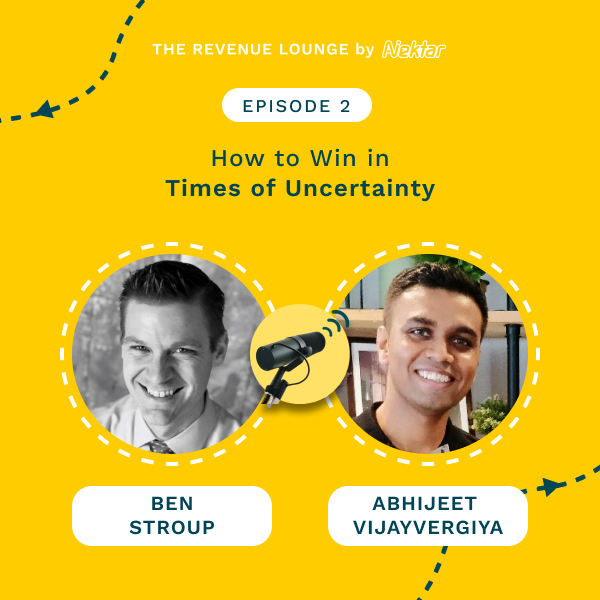
Ep #2: How to Win in Times of Uncertainty
Listen Now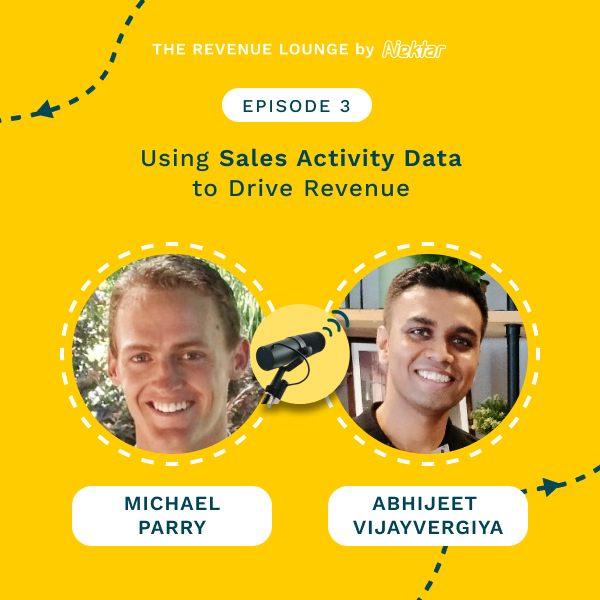
Ep #3: Using Activity Data to Drive Sales Productivity
Listen Now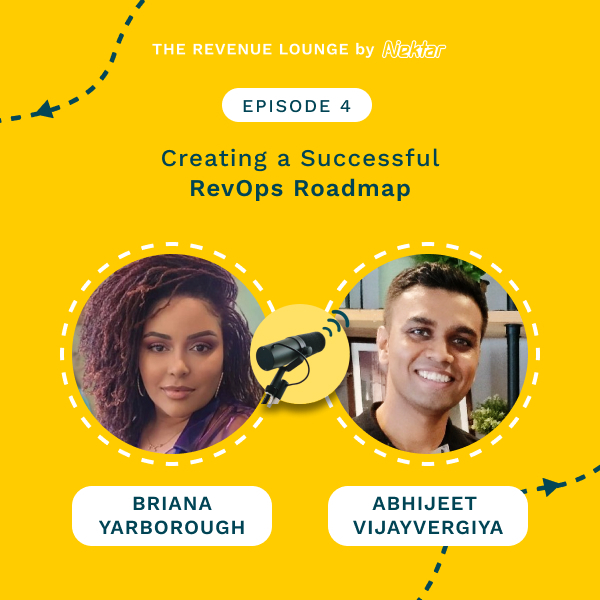
Ep #4: Creating a Successful RevOps Roadmap
Listen Now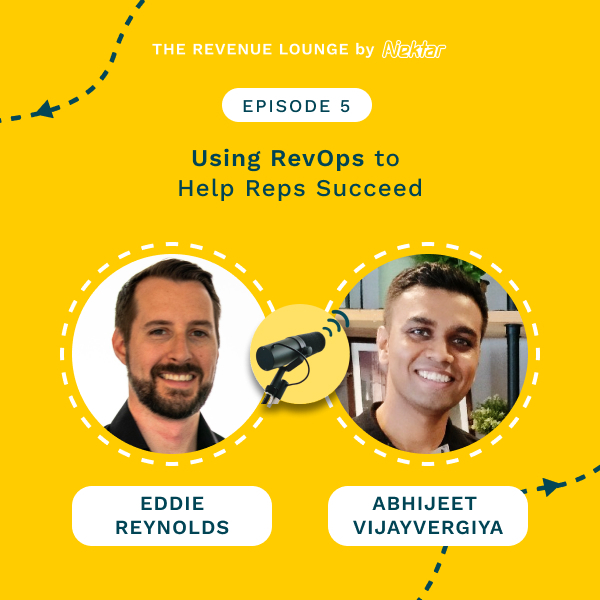
Ep #5: Using RevOps to Help Reps Succeed
Listen Now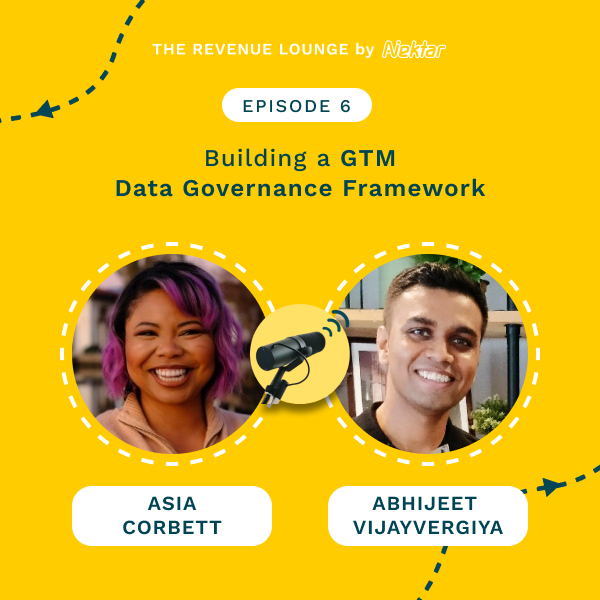
Ep #6: Building a GTM Data Governance Framework
Listen Now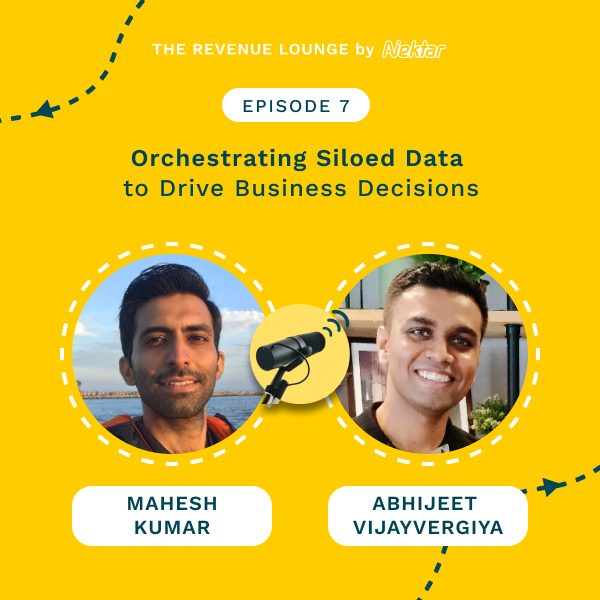
Ep #7: Orchestrating Siloed Data to Drive Business Decisions
Listen Now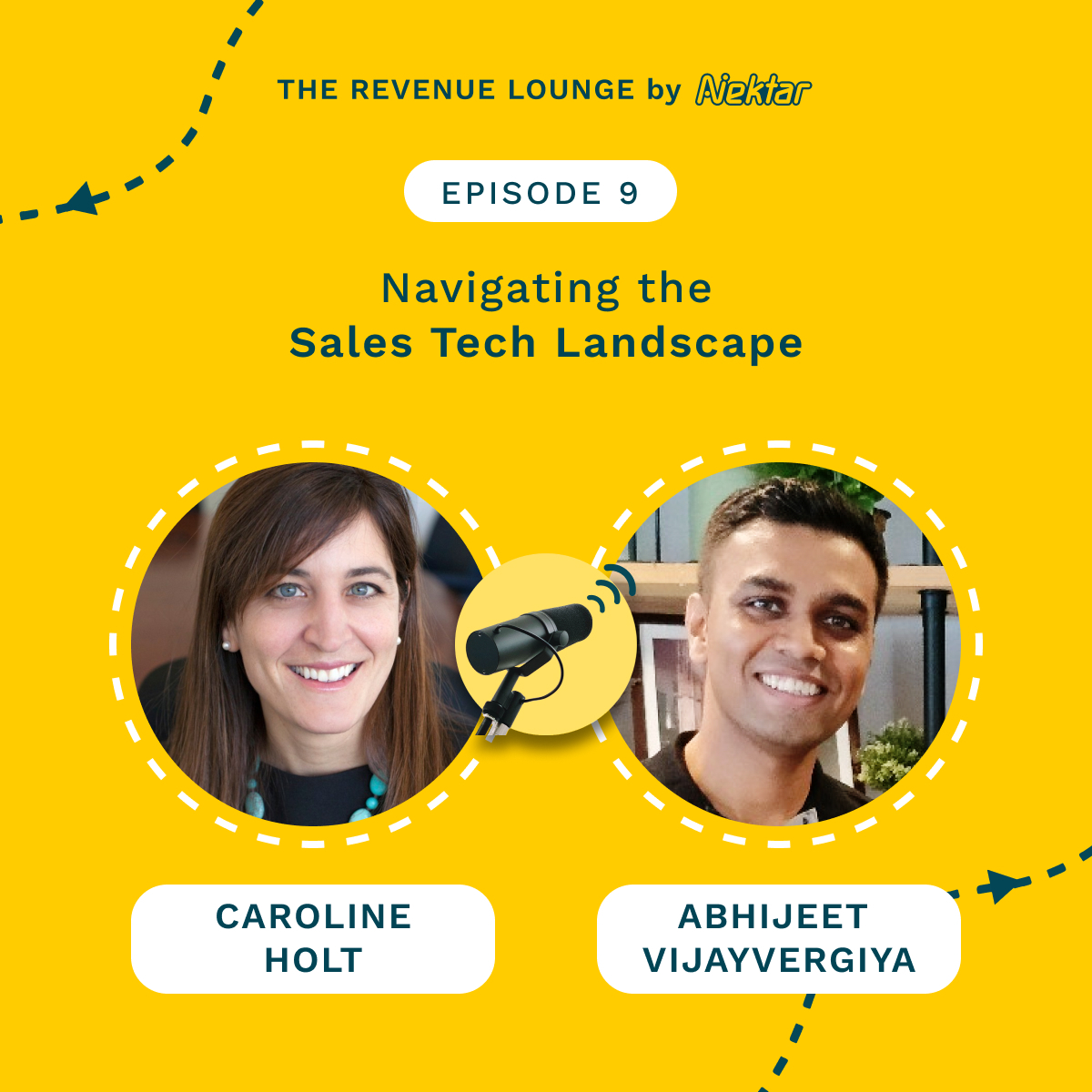
Ep #9: Navigating the Sales Tech Landscape
Listen Now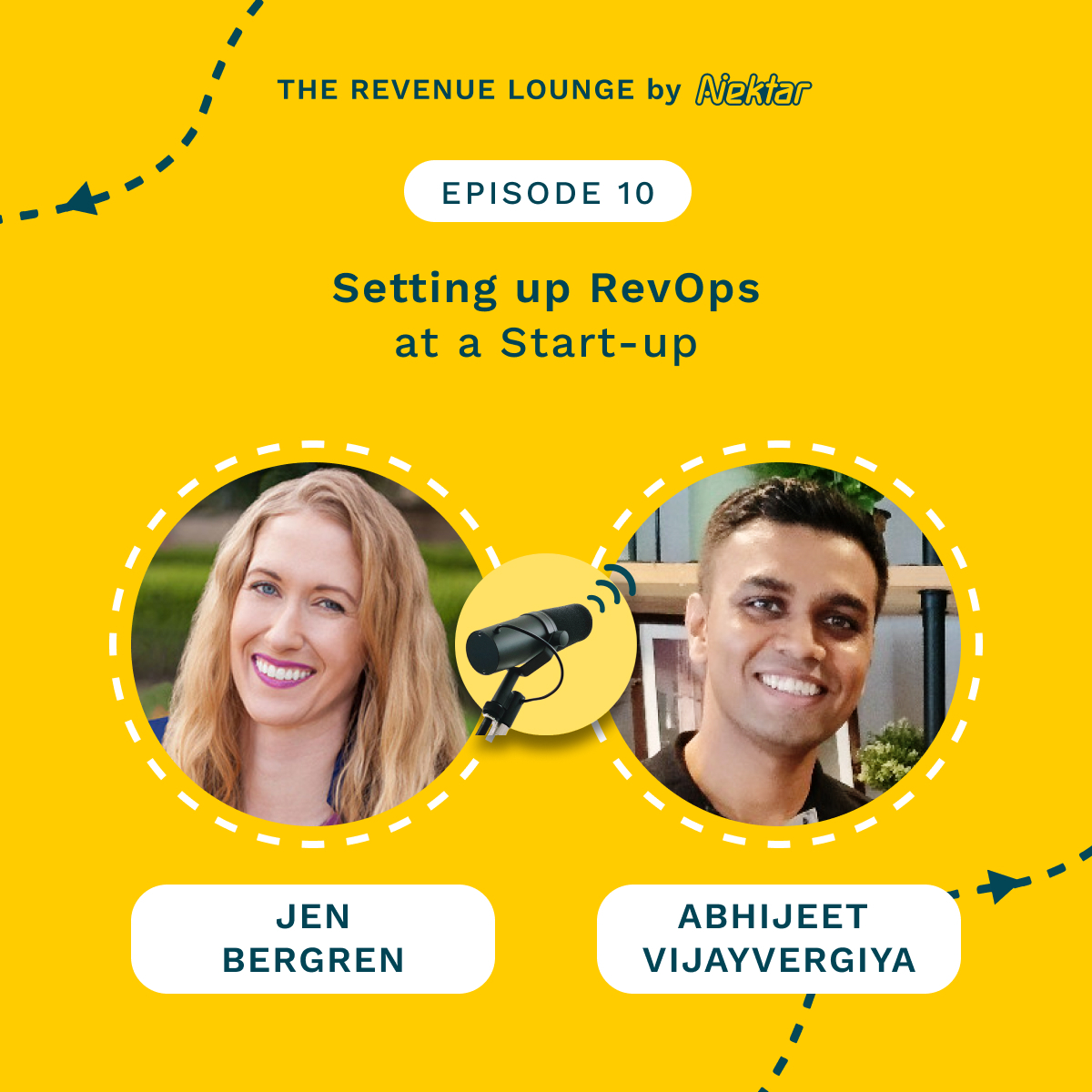
Ep #10: Setting Up RevOps at a Startup
Listen Now